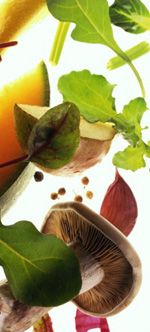| Purchase
The EGG
Drop a EGG into to each produce bin
in your fridge and you are on your way to saving money and having a constant supply
of of fresh Fruit and Veggies! | How
The EGG Keeps Produce Fresh
The EGG removes the gas that accumulates
in your Fridge, gases that make your produce age prematurely.
more | Keep
Produce Fresh
A number of storage conditions that can affect the life
of produce, including temperature, humidity and, of course, the gas that our EGG
absorbs. more | Produce
and Your Health
Fruits and vegetables can materially reduce our risk
of getting a variety of diseases. more | Produce
and the Environment
The EGG is environmentally friendly in two ways:
Most discarded produce sits in a landfill for generations. Produce directly converts
the sunís energy & less processing uses less resources. more |
| |
|
STORING PRODUCE |  |
 O Optimizing
storage of produce when you get it home is not as easy as it seems. There are
a number of storage conditions that can affect the storage life of produce, including
temperature, humidity and, of course, atmospheric ethylene. It seems that each
variety has its own set of preferences. Tips
for Storing Your Produce:
| (1) Store in the refrigerator or on the
countertop
Generally we think that keeping produce in the refrigerator
is going to improve storage life. For one thing, the effect of ethylene on aging
is certainly slowed by the cold. But it is easy to think of exceptions to this
assumption. For example, a potato tends to convert its starch to sugar if stored
too cold; an eggplant develops brown spots if stored in the refrigerator. But,
what about cucumbers - or bell peppers Ė or watermelon? Check the
UC Davis reference sheet to see if you guessed right. (2) Store
in the proper poly bag or in the open (lower humidity and allow for oxygen)
For those varieties that keep better in high humidity, it makes sense to store
them in a produce bag after purchase. If the humidity stays too high, you can
get some interesting, if not attractive, biological activity. Furthermore, produce
is alive, so it must be allowed to breath. The poly bags that the grocery store
supplies is not a good choice for storage because it can keep humidity too high
and excludes oxygen. Produce suffocates when stored in these bags. They are provided
for transport and are not intended for storage. There are produce bags on the
market that are permeable to oxygen and ethylene, while maintaining proper humidity
that some produce needs. (3) Have a low ethylene atmosphere.
If the produce is ripe, keeping it away from ethylene helps
maintain
freshness. | |  |
Each variety of produce has its own ethylene
response profile. Some are ethylene emitters, some are damaged by it, and
some are both. The only way to be sure that you are not storing incompatible varieties
together is to eliminate the ethylene entirely! The refrigerator may be good at
maintaining a storage temperature and humidity for produce that should be stored
there. But, it creates a problem for any ethylene sensitive produce. It traps
the ethylene generated by any thing in the refrigerator, allowing it to accumulate
to damaging levels. Refrigerators are designed to force its cool air to all parts
of the box. So, the produce drawers are not really isolated from each other. As
a result storing in different drawers is only marginally effective. If you use
the produce bags, part of their function is to prevent ethylene buildup around
its contents by allowing the ethylene out of the bag. But that leaves the rest
of the refrigerator with the accumulating ethylene. The answer is to remove all
ethylene as it is generated. Hence, the Ethylene Gas Guardian!!
| | Understanding
the optimum storage conditions for each variety of produce has been the topic
of a lot of academic and industry research. Two of the best known and widely respected
institutions are the University
of California at Davis and Sydney
Postharvest Laboratory. Although the information is
oriented to industrial application, their sites have a great deal of information
that is useful for home storage. | | |
| |

